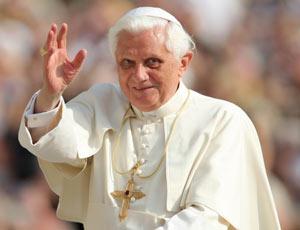My thoughts turn in a special way to the beloved country of Iraq, which continues to be a theatre of violence and strife as it makes its way towards a future of stability and reconciliation. Special Assembly for the Middle East of the Synod of Bishops encouraged the Catholic communities in Iraq and throughout the Middle East to live in communion and to continue to offer a courageous witness of faith in those lands.
MESSAGE OF HIS HOLINESS 1 JANUARY 2011 |
|
RELIGIOUS FREEDOM, THE PATH TO PEACE
The year 2011 marks the twenty-fifth anniversary of the World Day of Prayer for Peace convened in
My thoughts turn in a special way to the beloved country of
In this context, I have felt it particularly appropriate to share some reflections on religious freedom as the path to peace.
Religious freedom expresses what is unique about the human person, for it allows us to direct our personal and social life to God, in whose light the identity, meaning and purpose of the person are fully understood. To deny or arbitrarily restrict this freedom is to foster a reductive vision of the human person; to eclipse the public role of religion is to create a society which is unjust, inasmuch as it fails to take account of the true nature of the human person; it is to stifle the growth of the authentic and lasting peace of the whole human family.
For this reason, I implore all men and women of good will to renew their commitment to building a world where all are free to profess their religion or faith, and to express their love of God with all their heart, with all their soul and with all their mind (cf. Mt 22:37). This is the sentiment which inspires and directs this Message for the XLIV World Day of Peace, devoted to the theme: Religious Freedom, the Path to Peace.
A sacred right to life and to a spiritual life
The right to religious freedom is rooted in the very dignity of the human person
Religious freedom and mutual respect
Religious freedom is at the origin of moral freedom.
The family, the school of freedom and peace
If religious freedom is the path to peace, religious education is the highway which leads new generations to see others as their brothers and sisters, with whom they are called to journey and work together so that all will feel that they are living members of the one human family, from which no one is to be excluded.
A common patrimony
Religious freedom is not the exclusive patrimony of believers, but of the whole family of the earth’s peoples.
The public dimension of religion
Religious freedom, like every freedom, proceeds from the personal sphere and is achieved in relationship with others. Freedom without relationship is not full freedom.
Religious freedom, a force for freedom and civilization:
dangers arising from its exploitation
The exploitation of religious freedom to disguise hidden interests, such as the subversion of the established order, the hoarding of resources or the grip on power of a single group, can cause enormous harm to societies.
An issue of justice and civility: fundamentalism and hostility to believers
compromise the positive secularity of states.
Dialogue between civil and religious institutions
A healthy dialogue between civil and religious institutions is fundamental for the integral development of the human person and social harmony.
Living in love and in truth
In a globalized world marked by increasingly multi-ethnic and multi-religious societies, the great religions can serve as an important factor of unity and peace for the human family.
Dialogue as a shared pursuit
Moral truth in politics and diplomacy
Beyond hatred and prejudice
Religious freedom in the world
Religious freedom, the path to peace
The world needs God. It needs universal, shared ethical and spiritual values, and religion can offer a precious contribution to their pursuit, for the building of a just and peaceful social order at the national and international levels.
Peace is a gift of God and at the same time a task which is never fully completed.
May all men and women, and societies at every level and in every part of the earth, soon be able to experience religious freedom, the path to peace!

